Temporary clusters and cognitive proximity, new research from the Young Economic Geographers Network
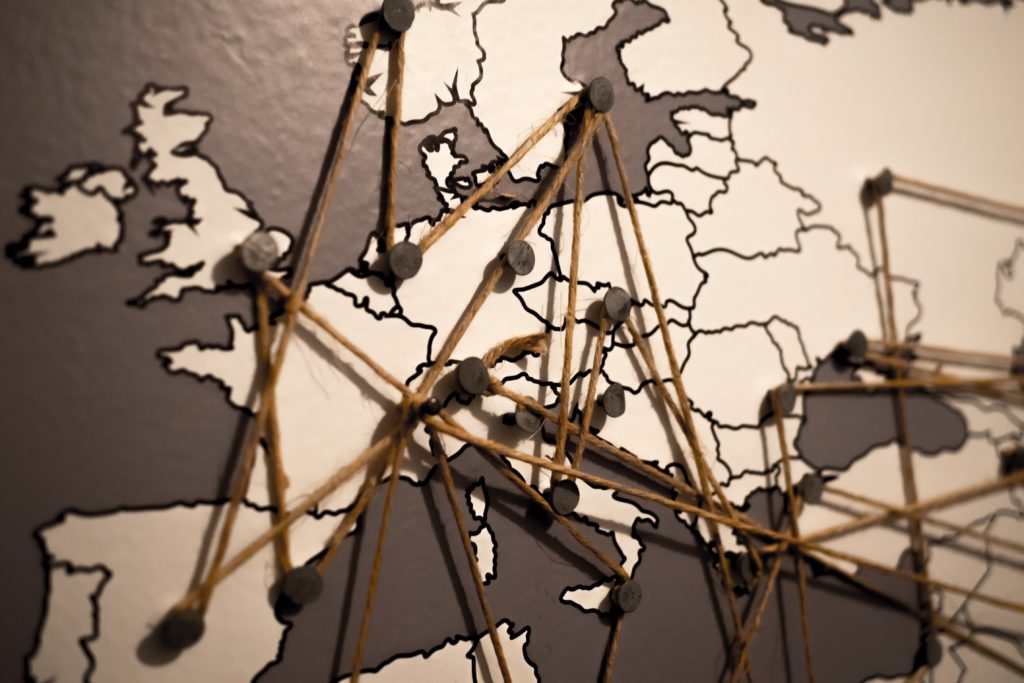
DOI reference: 10.1080/13673882.2018.00001014
By Moritz Breul and Thomas Neise, Institute of Geography, University of Cologne, Germany.
Moritz Breul and Thomas Neise share some reflections on the 2018 meeting of the Young Economic Geographers Network (YEGN) workshop and set an exciting agenda for future events to be held by the network.
:Introduction:
The Young Economic Geographers Network (YEGN) is a network established by PhD students from the University of Bern, Switzerland and Umeå University, Sweden, in 2016. The network aims to foster the exchange of ideas and to establish long-term contacts between young researchers in Economic Geography and related disciplines on an international level. Ongoing research projects are presented and discussed in an informal atmosphere during an annual workshop. The third workshop took place between the 20th and 22nd July 2018 in Lindlar, a small town close to Cologne, Germany. In order to attract more international participants, this year’s YEGN workshop ran as a side event of the fifth “Global Conference on Economic Geography” organized by the University of Cologne, Germany. This was a success, as 29 PhD students from eleven countries joined the YEGN-workshop.
Figure 1: Group photo of the YEGN participants (Source: Hulke 2018)
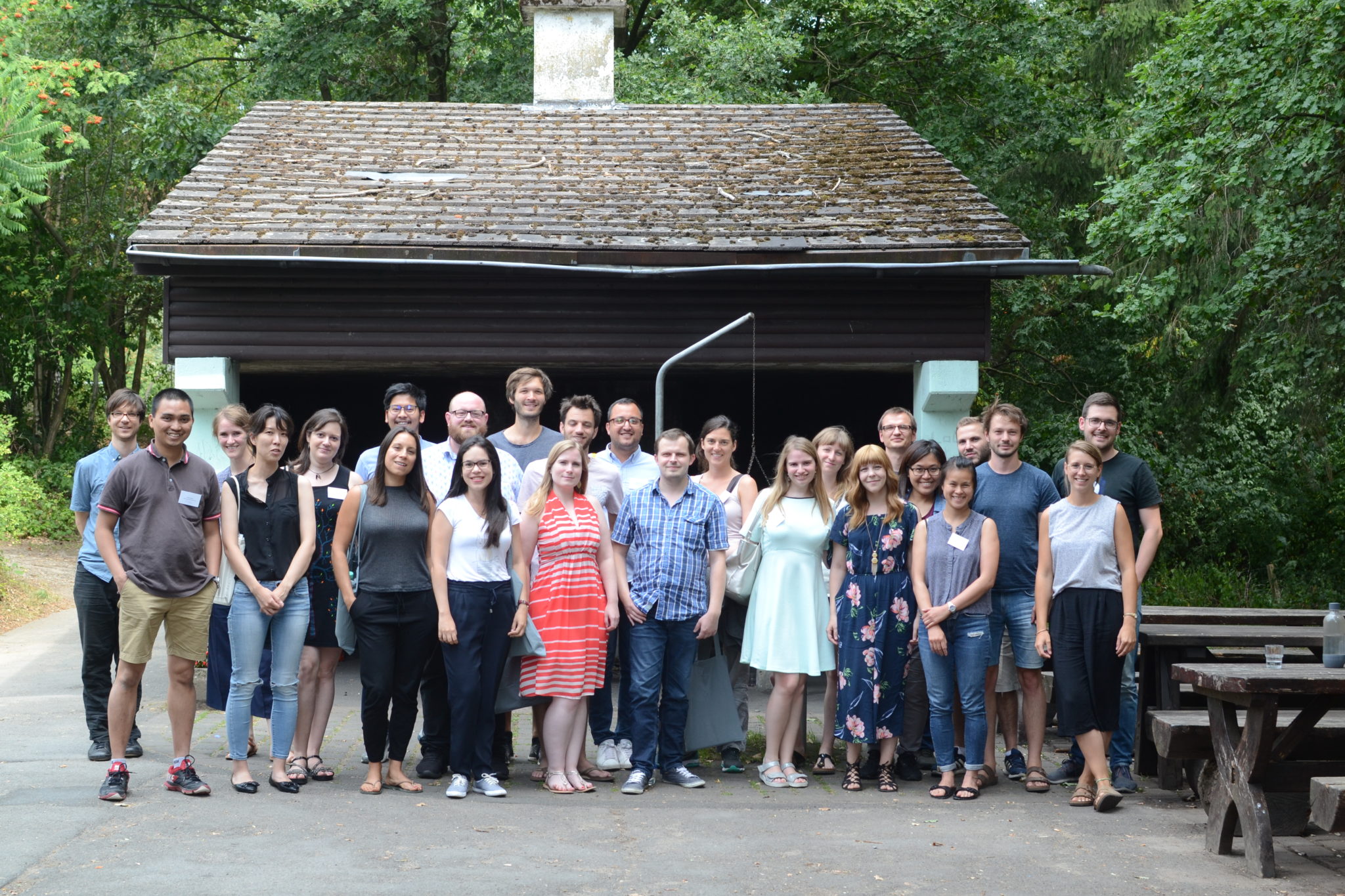
We would like to use this article to summarize this year’s YEGN-workshop and share some key reflections that we consider as valuable to paving the way for future events and to economic geography in general. In order to give this report some structure, we will discuss two concepts discussed in Economic Geography related to knowledge networks, which reflect our experiences quite well: temporary clusters (Bathelt & Glückler 2011) and cognitive proximity (Boschma 2005).
Temporary clusters, knowledge flows and the creation of opportunities
Various studies have illustrated how the temporary co-presence of agents in a particular fields at international trade fairs enables knowledge flows and the creation of opportunities for new transactions (see Bathelt & Glückler 2011). Similar effects also account for our discipline. International conferences and workshops constitute a crucial medium to meet peers, exchange knowledge and eventually start new collaborations through these temporary limited face-to-face encounters.
While large international conferences, such as the annual meeting of the Association of American Geographers (AAG), the annual conference of the Regional Studies Association (RSA), or the Global Conference on Economic Geography (GCEG), already provide a very conducive infrastructure to benefit from these advantages, our experience of the YEGN shows that particularly for young scholars, alternative temporary platforms of co-location can be highly complementary. Here, we highlight two features of the YEGN workshop that ourselves and the participants experienced as advantageous.
First, the workshop created a space without any hierarchies as only Ph.D. students were invited. This allowed an open dialogue among the participants. The discussions after each presentation were refreshingly equally distributed among all participants. There was little hesitation, which often happens at large conferences with senior researchers. At the same time, a generous time frame (20 minutes of presentation, 20 minutes of discussion), allowed ideas to be exchanged and developed jointly often leading to new lines of research or improvement to ongoing joint projects.
Figure 2: Presentation (Source: Hulke 2018)
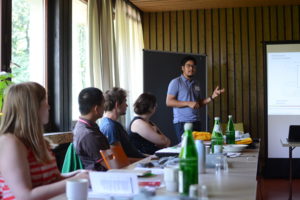
Second, about one-third of the workshop’s schedule was reserved for leisure activities such as hiking, barbecue, or table tennis beyond the usual ‘cafeteria effects’ during coffee breaks at conferences. This social exchange after and between the presentations on the one hand contributed to a good atmosphere during the more formal part of the workshop; on the other, it also created social ties that go beyond professional contacts. The remoteness of the workshop venue additionally contributed to this.
Overall, we feel that through the course of the three intensive and secluded days of the workshop strong international networks of peers were created; networks that were immediately apparent at the subsequent Global Conference on Economic Geography. It is hoped that this relational proximity might bridge the geographical distance for the future exchange of knowledge, joint projects.
Figure 3: Leisure activities during the workshop (Source: Neise 2018)
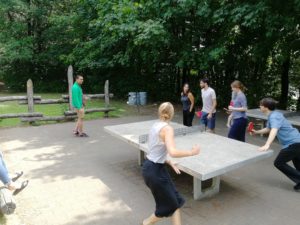
Optimal level of cognitive proximity and interactive learning
Different types of proximities influence interactive learning. In this context, an optimal level of cognitive proximity, referring to the overlap of actors’ knowledge bases, is decisive for interactive learning and the novelty of the outcome. Effective interactive learning requires, on the one hand, specific cognitive proximity to enable communication among the actors. On the other hand, a certain cognitive distance is required to benefit from new knowledge (Boschma 2005). A similar level of cognitive proximity must be given at conferences and workshops in our discipline to enable the exchange of knowledge and at the same time to benefit from new, but related knowledge.
Especially for young scholars in the early stages of their PhD, the possibility to tap into new knowledge bases from outside the dominant schools of thought of their home institutes may be helpful. From the experiences of the YEGN workshop, the participants’ expertise covered a broad thematic and methodological variety within topics of Economic Geography (see Figure.4). The workshop covered four broad thematic blocks, ranging from geographies of innovation to foreign direct investments, global production networks, and socio-ecological change. These thematic blocks were not prescribed beforehand but were the result of the submitted abstracts. Within the scope of the thematic blocks, the research projects dealt with different regions of the world (e.g. Argentina, India, Namibia, Turkey, and the USA) and diverse units of analysis (e.g. cities, multinational companies, smallholders, households, and highly qualified specialists). The presented research projects encompassed a diversity of topics that adopted insights from various disciplines (e.g. sociology, psychology, economics, political economy and hazard research).
Figure 4: Word cloud of submitted abstracts
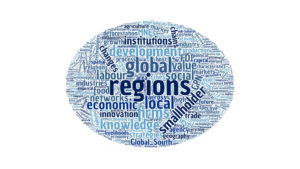
These multidisciplinary perspectives were primarily reflected in diverse methodological approaches. Quantitative methodologies ranged from city network analysis based on patent data, to household and smallholder surveys; the tracing of global virtual land flows; panel regressions on the impact of foreign direct investment on Technical Vocational Education and Training Systems; as well as the use of individual psychological characteristics aggregated on Metropolitan Statistical Areas, in order to explain how the application of innovation spreads across time and space. Qualitative approaches encompassed a range, from in-depth interviews and mapping techniques, novel methods such as auto-photography, and the Q methodology adopted from ethnology and psychology respectively.
This spectrum mirrors the variety of theoretical and methodological perspectives in contemporary Economic Geography, all pursuing a common central concern: to understand the dynamics of the unequal contours of the global economy. The intense exchange of ideas during the workshop days stimulated possible new perspectives and methods in the participants’ research and indicates that a certain level of optimal cognitive proximity was present.
Concluding remarks
The workshop format has shown that it can be a useful complementarity to the existing conference landscape in Economic Geography, in particular for young scholars: First, from our experience, the workshop has enabled the creation of an international network among young economic geographers. Second, the participants benefited from optimal cognitive proximity, which allowed them to exchange diverse perspectives, schools of thought, and methodologies. What is more, feedback at the end of the workshop indicated demand for mini-workshops within the workshop that might strengthen this interactive learning in variety further.
Since the last three YEGN workshops have taken place in German-speaking regions, it is hoped to bring the next YEGN workshop to another country and further develop the international profile of the YEGN.
For more information about the YEGN and future events please visit https://yegn.wordpress.com/
References
Bathelt, H. & J. Glückler (2011). The Relational Economy: Geographies of Knowing and Learning. Oxford University Press: Oxford.
Boschma, R. (2005). Proximity and Innovation: A Critical Assessment. Regional Studies 39 (1): 61-74.
About Moritz and Thomas
Moritz Breul and Thomas Neise are PhD. students at the Institute of Geography at the University of Cologne. In his research Moritz focuses on the role of gateway cities in global production networks in Southeast Asia. Thomas studies the exposure to natural hazards and the firms’ decision-making between individual and collective adaptation in Indonesia.